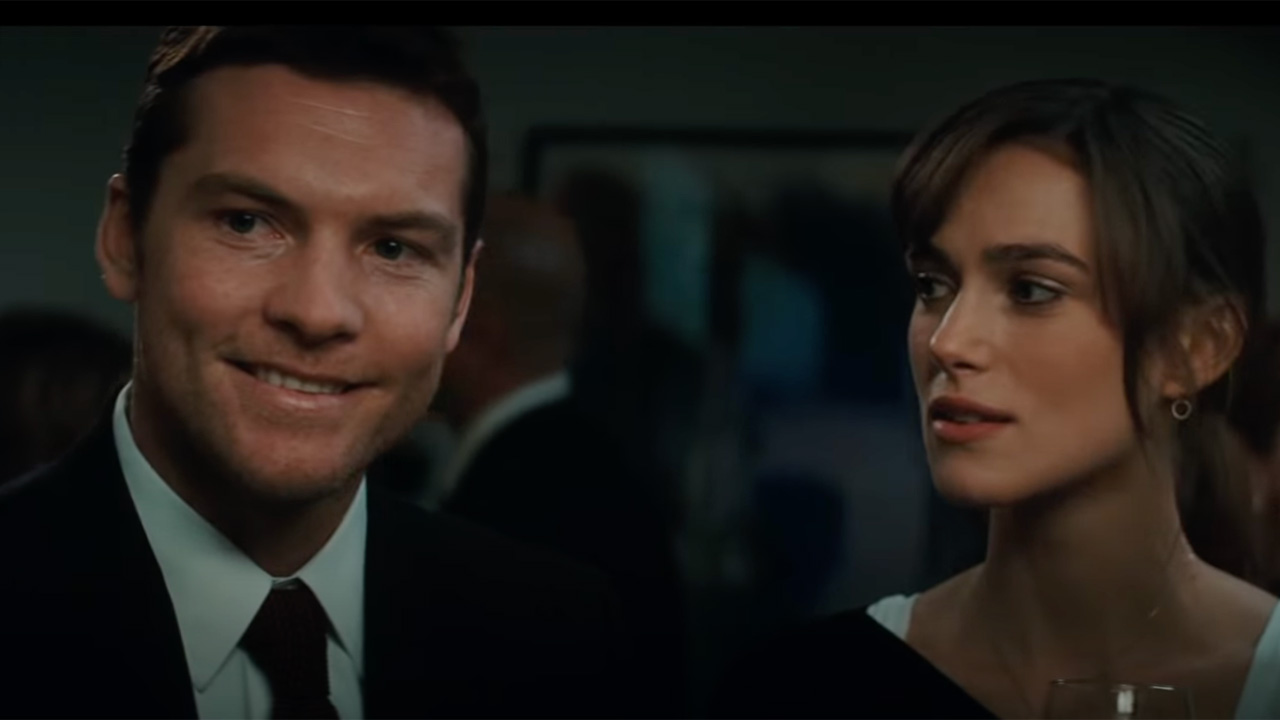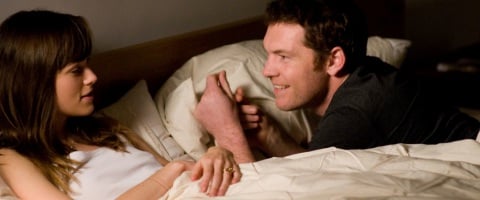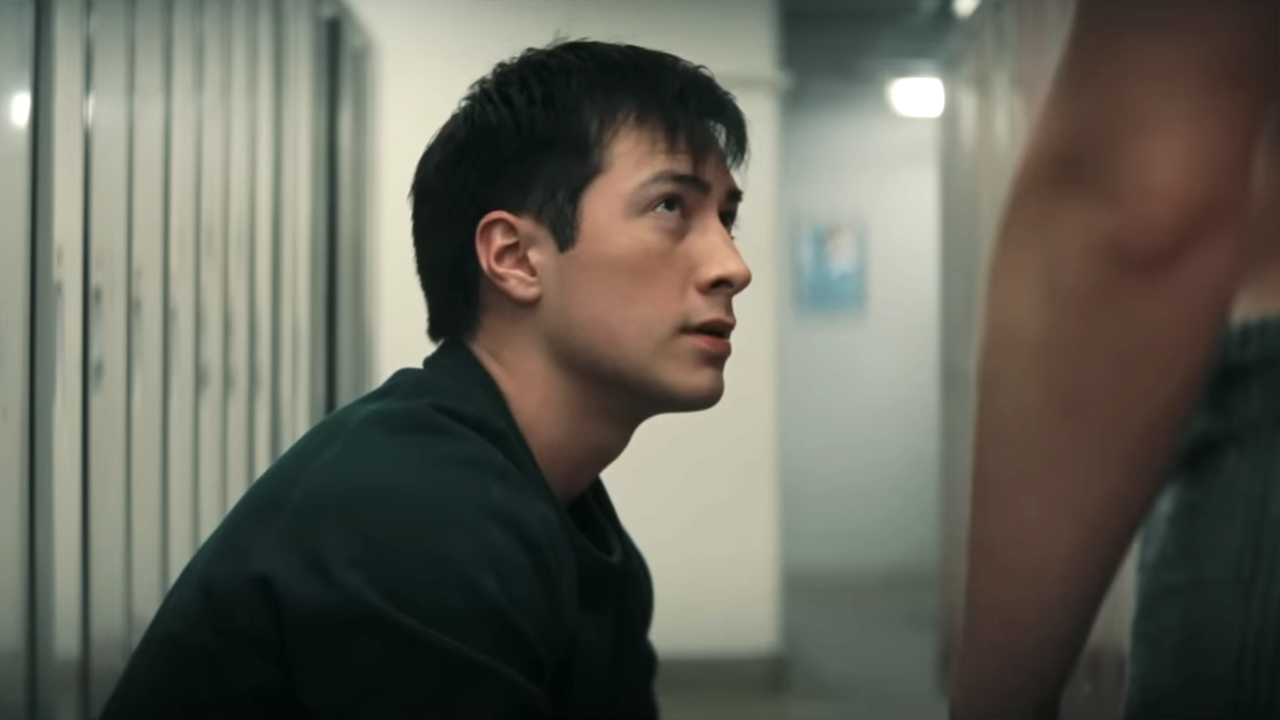Interview: Massy Tadjedin On Directing Keira Knightley And Sam Worthington In Last Night
Was so worth(ington) it.

Last Night stars two actors from two of the biggest movies of all time, Pirates of the Caribbean's Keira Knightley and Avatar's Sam Worthington. And yet, this stripped-down and very, very intimate drama is maybe exactly what you wouldn't expect form the two of them, baring their souls as married couple Michael and Joanna, separate for one evening and each running into temptation toward very different kinds of infidelity. Michael is on a business trip with a very comely co-worker (Eva Mendes), while Joanna bumps into a former flame (Guillaume Canet) who's in town for only one night; what decisions each of them make, to cheat or not to cheat, even while loving each other dearly, make up the minutely observed and constantly heartbreaking Last Night.
Massy Tadjedin makes her directorial debut with this film, which you almost never got to see-- it was purchased by Miramax in its third week of production and then languished there while the company went up for sale, and Miramax parent company Disney unwilling to do anything with the film for fear of stepping on the toes of Miramax's eventual buyer. As Tadjedin put it they caught a lucky break when Disney allowed them to take the film to the Toronto International Film Festival last fall, where it was the closing night gala and where Tribeca Film-- the company behind the New York festival and a new distributor-- sparked to the movie set in their neighborhood. Tribeca Film is releasing Last Night now theatrically (it expands wider this Friday) and on-demand.
I caught up with Tadjedin at the tail end of the Tribeca Film Festival and asked her about the headaches of making a film only to see it sit unreleased for nearly two years. We also talked about how to tell a story about infidelity without judgment, how she built the film around Knightley (who she had worked with on the 2005 film The Jacket, which Tadjedin wrote) and why the central couple lives in an incredibly huge apartment by New York standards. For more on the film you can also read my review here.
You cast Sam Worthington well before Avatar came out. What did you see in him that made you want him on board?
I had seen him in this Australian film called Somersault with Abbie Cornish, and both of them had caught my eye. I sent Sam the script and met with him while he was shooting Avatar-- it was well before anyone knew Sam was going to go on and do these enormous films. He had great sympathy for the character of Michael, and I thought he would have a great married chemistry with Keira.
Because you had known her before this. Did you write the role with her in mind?
I hadn't written it for her, but I haven't yet written for people. I do sometimes write with people in mind. I think the Joanna I had in mind was somewhere between Julie Christie and Natalie Wood. I think my men tend to be written with Paul Newman in mind.
Your Daily Blend of Entertainment News

So you write for actors who can never do it.
But I had to persuade Keira to do it, and that anchored the casting process. They're not four roles you can cast simultaneously, because they're very chemistry dependent. A couple needs to have a certain texture to their relationship and their marriage that is very different from the physicality and the attraction with their respective others. So it's one at a time. Then Guillaume Canet I met first as a director. He was screening his film Tell No One. These things are so instinctive; I just thought, they will have great chemistry together. Eva, I met her and really thought she would be great in presenting Laura warmly.
It seems like you feel the need to defend that character, because she could be perceived as a homewrecker.
I do, because it's so easy to judge cheating when some of it is ostensibly seducing. When there is sexual cheating involved it's very easy to judge, because there's a clear line that's been crossed. Part of what the film is looking at is that there are degrees of everything. Sometimes there is a lack of awareness of our involvement with other people, what could be damaging or too intimate. It's so easy when you're watching or reading a story to just judge something. It puts that distance-- she's a vixen, she beelined for that man, that's just a person to avoid. And that's not how life works.
The movie occupies those spaces and really carefully observes the way the actors move around each other. How did you work with that chemistry and alter the film based on that?
I had never directed a film before, but you spend hours on a description or a line--and I still think having done this that it's extremely worthwhile, because that sentiment that you have written on the page and want revealed is passed on to the actor. Then when you go to set and the thing starts to breathe, and the people start to live in these bodies, they shorthand express it in a way that makes the three hours of work in the afternoon so unnecessary. You have a line and you know when you're shooting it, watching it up close, and you know that before they've delivered the line, their eyes have. The last look of the film, from Sam, it was scripted as a question-- "What did you do last night?" But it never felt honest when he asked it, because his eyes had already asked it.
Did you ever write any more of the scene between Keira and Guillaume? Their scenes together seem less written.
No, their scenes were like that. I think I cut a little bit of Michael and Laura, because we were able to get some of their tension from looks. But that was all scripted. We knew when were rehearsing, the chemistry the two of them [Keira and Guillaume] had, that the conversations would feel familiar to them.
Michael and Joanna live in this really gorgeous downtown apartment-- they're really young and really rich. How did you choose to make them that way?
First of all, the apartment was really hard to find. We looked for the apartment for three weeks and we came down to the wire. I still stand by the choice, but having said that, we were always concerned about how this would translate to the screen. We were trying not to have them be uber-weatlhy, just a successful working couple. But there are logistical concerns. We needed access for an elevator, space to fit the crew-- it was always important to me in that apartment for there to be enough corners and places in the apartment to show how these two have inhabited this space. What corners are hers, what corners are his. There's not a lot of history in the film. The history is really in the flea market furniture that belongs to them, the TV that belongs to him but not to her. But at the same time she's claimed a whole corner of the apartment for her books and stuff. But it is a larger apartment, and I wonder if we had an extra week to look… But it is important that this be like life that we know it, not as a very rarefied couple in New York knows it.
There's a consistent look to this movie that just feels like downtown New York-- the Soho House, the neighbor's apartment, the loft party.
We wanted it to feel like life right now in downtown New York. And I love when you watch films from the 70s and 80s and get a glimpse of what it meant to live at that time, or even if it's not the everyday life of most of us at that time, what the aesthetics of that tie were. And I also wanted it to have a timelessness in terms of the decor and look of the film. I didn't wants it to be hyper trendy. I wanted this film to look relevant.

Wasn't there a point where you thought it might only be released on DVD?
We really had no idea how or if it was going to come out. Occe a year is passed everyone is generally concerned. And there was the question of it coming out in Europe, and that makes me very worried, because everything is so immediately online. Everything is so easy to get your hands on. . The thing I think I learned on this, and it was a good thing to learn, is that there is no point at which you are certain of the outcome. So you have to take the enjoyment and satisfaction that you can int he making of it and trust that it will find its way.
Was the warm reception at Toronto a huge relief for you?
What was great about Toronto is that we hadn't seen the film with an audience. To see it at Roy Thompson Hall, just to watch it with a group of people after that long wait, it was hugely rewarding. The biggest thing you have when you finish the film is, "Is anyone going to get this?" You write something and direct it and wonder, is anyone going to get what we were trying to say? And you don't really get that until you sit with an audience.
VOD is so crucial for films like this, being so small and getting seen. I think the intimacy of this film really works for that format, but since no filmmaker ever makes a movie with TV in mind, I wonder how you feel about that.
It's all very new to me, so I'm interested in seeing how it goes. It is very satisfying to watch it with an audience for me, because you get to see the collective resistance or anxiety about what these characters are doing. But I do watch films by myself alone in my house, a lot, and this being available to watch that way is a good thing. I grew up in Yorba LInda, and we didn't have a movie theater in Yorba Linda. We had one theater in Anaheim, and it didn't have the movies that I was dying to see. And I would have to wait a very long time for those films to come and be available on VHS. I think then I really would have appreciated. My 14-year-old self would have been able to see this movie.
Staff Writer at CinemaBlend

